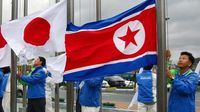North Korea has issued a stern warning to Japan regarding its plans to deploy long-range missiles in the Kyushu region, emphasizing that such an action will escalate tensions in Northeast Asia. In a statement released on March 20, 2025, North Korea's state media, KCNA, criticized Tokyo's intentions, claiming it would lead to a continuous rise in hostility in the region.
Japan is considering the deployment of these missiles by March 2026 as part of a broader strategy to enhance its “counterstrike capabilities” to potentially retaliate against threats in a crisis. This proposal has alarmed North Korean officials, who perceive it as an aggressive shift in Japan’s military posture.
North Korean authorities accused Japan of perpetuating a history of aggression through actions that include the bolstering of military alliances, specifically the Japan-U.S. military relationship and perceived cooperation with NATO forces. In their response, North Korea stated that “all military means and various forms of movement directly targeting the DPRK are an object to be wiped out,” referencing the Democratic People's Republic of Korea's (DPRK) stance against hostile actions.
Adding to these tensions, North Korean leader Kim Jong Un underscored last month the increasing trilateral military cooperation between the United States, Japan, and South Korea. He indicated such cooperation only exacerbates regional instability and pledged to enhance North Korea’s nuclear capabilities as a countermeasure to perceived threats.
Japan’s considerations for missile deployment reflect a significant pivot in its defense strategy, a point acknowledged by government sources highlighting the need for robust capabilities in light of regional threats. Such developments raise the crucial question of how Asia’s security landscape is evolving and what responses might emerge from neighboring countries.
Moreover, North Korea's rhetoric emphasizes its unwillingness to tolerate any perceived encroachments on its sovereignty. The country’s government has openly stated that all projections and movements aimed toward the DPRK, particularly those established by Japan and its allies, will be met with serious consequences.
The growing strains between these nations highlight significant geopolitical concerns and underline the fragile nature of peace in Northeast Asia. As Japan explores military enhancements and North Korea reiterates its defensive posture, analysts are closely monitoring the situation, wondering if there will be further reciprocal actions.
In conclusion, the warning from North Korea serves as a stark reminder of the ongoing tensions that shape diplomatic relations in the region. Efforts to enhance military capabilities, whether by Japan or its allies, might provide short-term security but could ultimately threaten long-term stability as regional powers navigate the precarious balance of deterrence and aggression.

